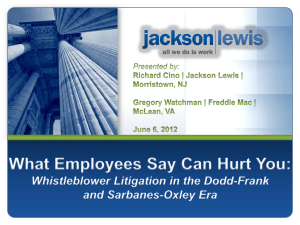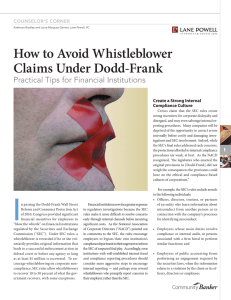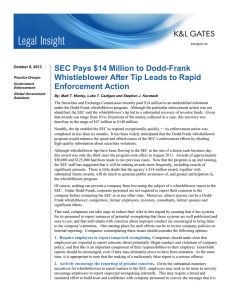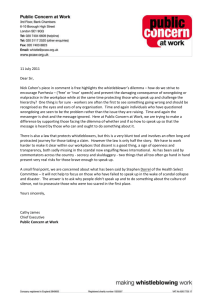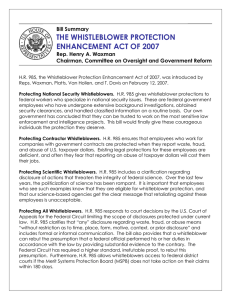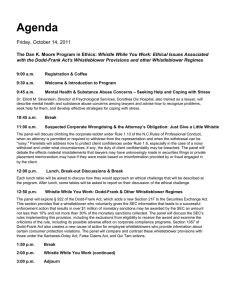The SEC Is Actively Encouraging Whistleblowers: How Should You Respond?
advertisement
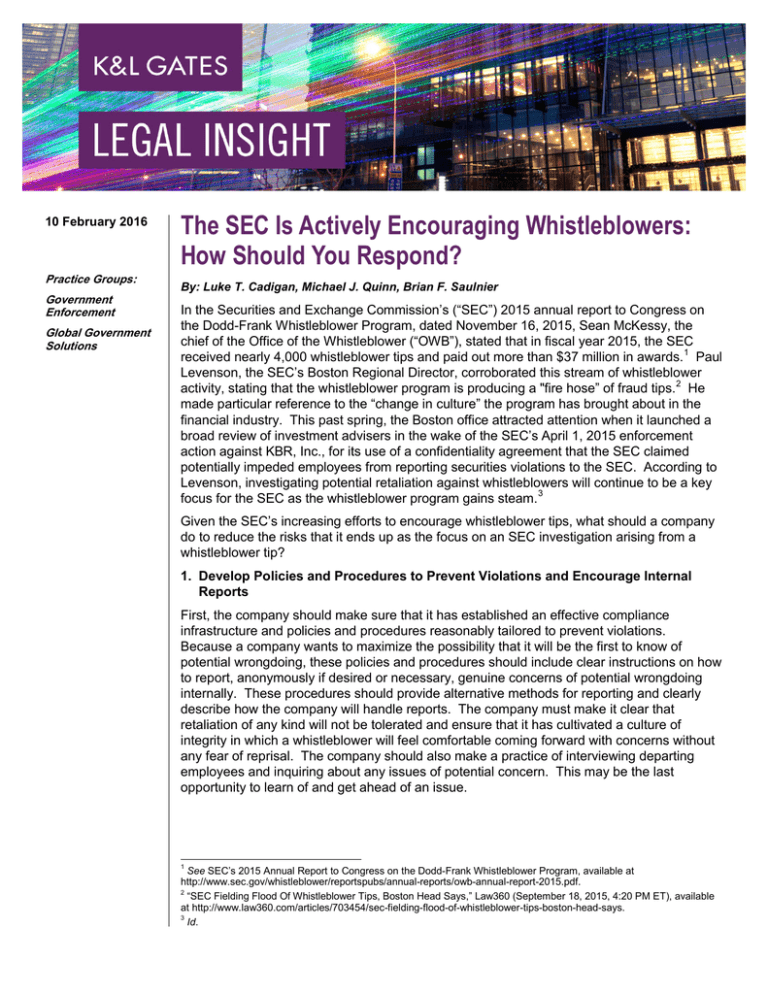
10 February 2016 Practice Groups: Government Enforcement Global Government Solutions The SEC Is Actively Encouraging Whistleblowers: How Should You Respond? By: Luke T. Cadigan, Michael J. Quinn, Brian F. Saulnier In the Securities and Exchange Commission’s (“SEC”) 2015 annual report to Congress on the Dodd-Frank Whistleblower Program, dated November 16, 2015, Sean McKessy, the chief of the Office of the Whistleblower (“OWB”), stated that in fiscal year 2015, the SEC received nearly 4,000 whistleblower tips and paid out more than $37 million in awards. 1 Paul Levenson, the SEC’s Boston Regional Director, corroborated this stream of whistleblower activity, stating that the whistleblower program is producing a "fire hose” of fraud tips.2 He made particular reference to the “change in culture” the program has brought about in the financial industry. This past spring, the Boston office attracted attention when it launched a broad review of investment advisers in the wake of the SEC’s April 1, 2015 enforcement action against KBR, Inc., for its use of a confidentiality agreement that the SEC claimed potentially impeded employees from reporting securities violations to the SEC. According to Levenson, investigating potential retaliation against whistleblowers will continue to be a key focus for the SEC as the whistleblower program gains steam. 3 Given the SEC’s increasing efforts to encourage whistleblower tips, what should a company do to reduce the risks that it ends up as the focus on an SEC investigation arising from a whistleblower tip? 1. Develop Policies and Procedures to Prevent Violations and Encourage Internal Reports First, the company should make sure that it has established an effective compliance infrastructure and policies and procedures reasonably tailored to prevent violations. Because a company wants to maximize the possibility that it will be the first to know of potential wrongdoing, these policies and procedures should include clear instructions on how to report, anonymously if desired or necessary, genuine concerns of potential wrongdoing internally. These procedures should provide alternative methods for reporting and clearly describe how the company will handle reports. The company must make it clear that retaliation of any kind will not be tolerated and ensure that it has cultivated a culture of integrity in which a whistleblower will feel comfortable coming forward with concerns without any fear of reprisal. The company should also make a practice of interviewing departing employees and inquiring about any issues of potential concern. This may be the last opportunity to learn of and get ahead of an issue. 1 See SEC’s 2015 Annual Report to Congress on the Dodd-Frank Whistleblower Program, available at http://www.sec.gov/whistleblower/reportspubs/annual-reports/owb-annual-report-2015.pdf. 2 “SEC Fielding Flood Of Whistleblower Tips, Boston Head Says,” Law360 (September 18, 2015, 4:20 PM ET), available at http://www.law360.com/articles/703454/sec-fielding-flood-of-whistleblower-tips-boston-head-says. 3 Id. The SEC Is Actively Encouraging Whistleblowers: How Should You Respond? 2. Address Internal Reports Promptly and Effectively It has been commonly reported that 90 percent of whistleblowers first raised their concerns with the company before going to the authorities. Companies should therefore develop plans in advance and be prepared to act quickly in response to reports of potential wrongdoing. This includes training employees, especially supervisors, to recognize and respond appropriately to potential violations or reports of wrongdoing or inappropriate conduct. In certain cases, the company may want to undertake an internal investigation of the issue. Depending on the character or potential magnitude of the issue and the personnel that might be implicated, or as necessary to safeguard the attorney-client privilege, the company may consider having independent outside counsel conduct the investigation. This is particularly the case when the report relates to conduct by upper management who may be in a position to influence investigations conducted internally. In any event, the company must ensure that it has reasonably and thoroughly investigated the matter and taken whatever remedial actions are necessary or appropriate. The SEC or other agencies or regulators, such as the Equal Employment Opportunity Commission, the National Labor Relations Board, or the Financial Industry Regulatory Authority, may learn of the matter and question what steps the company took in response. To the greatest extent possible, the company should communicate with the employee who made the report to ensure him or her that the company is taking action and, where appropriate, advise the employee of the results of the investigation and any related corrective actions taken by the company. 3. When Responding to SEC Inquiries, Be Aware There May Be a Whistleblower Given the number of regulatory enforcement investigations arising from whistleblower complaints, companies should consider the possibility of underlying whistleblower allegations when responding to a broad variety of SEC inquiries. If the investigation was prompted by a whistleblower, the SEC staff will be influenced, at least initially, by his or her allegations, and it will be unlikely to drop an investigation until it is convinced that there is no basis on which to pursue a potential case. The SEC staff is not likely to be persuaded by attacks on the whistleblower and his or her motivations. Indeed, such attacks may offend the SEC staff and prompt further investigation of potential retaliation. Companies should focus on addressing the substance or merits of the potential concerns to the extent they can be discerned them from the SEC’s line of inquiry. As in any SEC investigation, a company will be best served and will receive a better reception if it is able to demonstrate cooperation (as appropriate), credibility, competence, and substantive responses grounded in the record of the underlying conduct, statement, or operation. 4. Take Steps to Reduce Risk of Retaliation Claims The SEC intends to vigorously pursue claims of retaliation against whistleblowers. To avoid the risk of a retaliation claim, a company must make it clear to employees in its policies, procedures, and communications that retaliation of any kind will not be tolerated. It is important that companies gather evidence and evaluate the credibility and merits of internal reports of wrongdoing rather than investigate the employees who reported it. Employment counsel should be consulted on all dealings with known whistleblowers and employees who have made internal reports of alleged wrongdoing. Companies should make efforts to limit the number of individuals aware of the identities of known whistleblowers or employees who have raised concerns internally. Similarly, a company should not undertake any efforts to 2 The SEC Is Actively Encouraging Whistleblowers: How Should You Respond? identify a whistleblower who elects to report anonymously. Focusing on the content of the internal report, rather than the identity of the reporter, is one way that companies can reduce the risk of claimed retaliation. Employee evaluations of any persons who made internal reports of potential wrongdoing should be prepared carefully and without any element or appearance of retaliation or reprisal. Finally, McKessy warned that a top OWB priority will continue to be its investigation into company confidentiality agreements that may operate to chill individuals from making reports to the SEC 4 even, as in the KBR, Inc. case, where there is no evidence that the agreements were designed to, or in fact did, impede such reports. Thus, companies need to be careful to avoid using any agreements or language that may inadvertently suggest an employee or departing employee is in any way prohibited or restricted from talking to the government. Authors: Luke T. Cadigan Michael J. Quinn Brian F. Saulnier luke.cadigan@klgates.com +1.617.261.3118 michael.quinn@klgates.com +1.310.552.5046 brian.saulnier@klgates.com +1.412.355.6504 +971.4.427.2797 Anchorage Austin Beijing Berlin Boston Brisbane Brussels Charleston Charlotte Chicago Dallas Doha Dubai Fort Worth Frankfurt Harrisburg Hong Kong Houston London Los Angeles Melbourne Miami Milan Newark New York Orange County Palo Alto Paris Perth Pittsburgh Portland Raleigh Research Triangle Park San Francisco São Paulo Seattle Seoul Shanghai Singapore Spokane Sydney Taipei Tokyo Warsaw Washington, D.C. Wilmington K&L Gates comprises more than 2,000 lawyers globally who practice in fully integrated offices located on five continents. The firm represents leading multinational corporations, growth and middle-market companies, capital markets participants and entrepreneurs in every major industry group as well as public sector entities, educational institutions, philanthropic organizations and individuals. For more information about K&L Gates or its locations, practices and registrations, visit www.klgates.com. This publication is for informational purposes and does not contain or convey legal advice. The information herein should not be used or relied upon in regard to any particular facts or circumstances without first consulting a lawyer. © 2016 K&L Gates LLP. All Rights Reserved. 4 Sean McKessy, Chief of the SEC’s Office of the Whistleblower, Comments at Thomson Reuters’ 4th Annual Corporate Whistleblower Program (Sept. 9, 2015). 3
